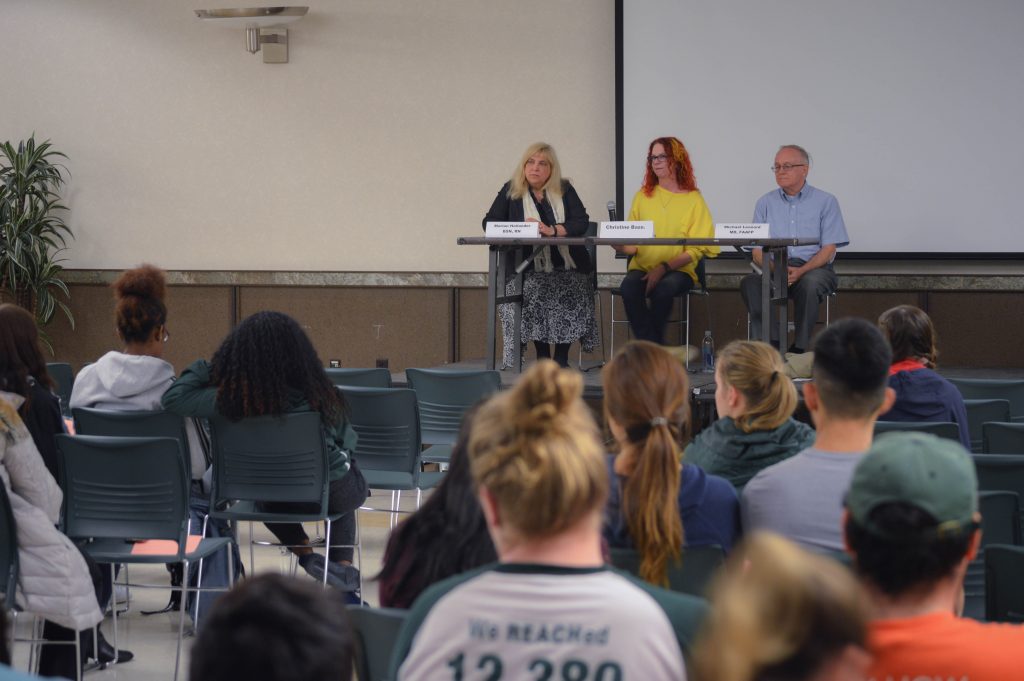
Christine Baze, an Elmira, New York native and a survivor of cervical cancer, has been telling people about her experiences with human papillomavirus, or HPV, for years.
On Tuesday evening, students, faculty and community members gathered in Old Union Hall for a screening of “Someone You Love: The HPV Epidemic,” a documentary that explores the stories of women suffering from HPV, including Baze, who is featured in the film.
The screening was sponsored by the Real Education About College Health (REACH) peer education program in collaboration with the Broome County Health Department, the BU Department of Health Promotion and Prevention Services and Excellus BlueCross BlueShield, a nonprofit health insurance company, in an effort to educate the general public on HPV and the HPV vaccine.
According to the Centers for Disease Control and Prevention, HPV is the most common sexually transmitted infection, with 79 million men and women currently infected in the United States, and can lead to cancer or genital warts. To help prevent the contraction of HPV, doctors recommend a series of vaccinations for preteens.
Emma Hunter, a REACH health educator and event coordinator at BU, said she first became aware of the documentary through an internship with the Tompkins County Health Department. Hunter said that providing a space to have an open conversation about HPV is incredibly valuable for students.
“This highly stigmatized and often misunderstood virus infects almost all sexually active people at some point in their lives,” Hunter said. “It’s crucial we break down the myths and stigma surrounding HPV. I hope students walk away with the understanding that HPV is completely normal and incredibly common. It is nothing to feel bad about or to hide, but it is important to protect yourself from and educate yourself about the virus.”
The 2014 documentary told the stories of Baze and four other women: Susie Carrillo, Tamika Felder, Kelly Pozzoli and Kristen Forbes. The film focused on their struggles with HPV and cervical cancer, including dealing with the inability to have children, chemotherapy, radiation and how it can often lead to intimacy issues within relationships.
Following the screening, attendees participated in a Q&A panel, moderated by Hunter, and featuring Baze; Michael Leonard, the medical director of Decker Student Health Services; and Marian Hollander, a public health nurse for the Broome County Health Department.
Featuring questions from attendees, the panel touched on topics such as the controversy surrounding the vaccine and how to support someone who has been diagnosed with HPV or cervical cancer.
In regards to its controversy, Leonard said the vaccine is very effective and presents a new optimism for the elimination of the HPV epidemic.
“I think focusing on the hope is really important,” Leonard said. “We have this vaccine that is actually a wonderful vaccine and it doesn’t seem to get the press that it should. Overall, it’s about 95 percent effective and when that came out in 2006, I didn’t believe it because there is no vaccine that reaches that. Not only did that hold, but in 2014 they came out with a broader [vaccine] that covered even more HPV types.”
Ann Teri, a junior majoring in human development, attended the event with some knowledge of the disease, but said she left with a better understanding of its impact.
“It really opened my eyes to how important [this issue] is,” Teri said. “I mean, I know what [HPV] is— you always hear the statistics and numbers of it, but hearing the stories of the real people and their experiences is so different. It was so raw.”
The panel ended by reminding the audience that HPV shots are available at Decker Student Health Services and the Broome County Health Department Clinic. The costs of the shot vary depending on insurance, but through the New York State Vaccines for Adults Program, some may be able to receive the shot for free.


